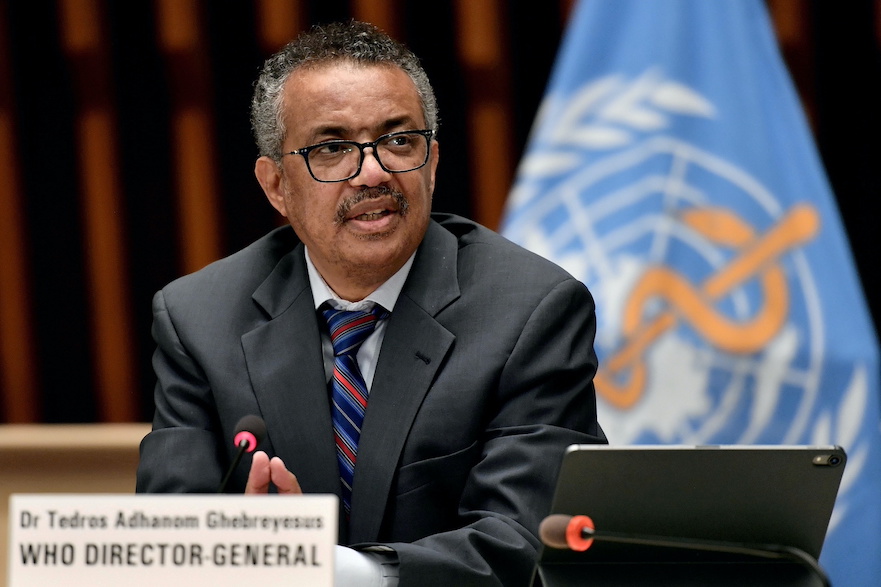As the world bids farewell to 2023 marked by the lingering impact of the COVID-19 pandemic, the Director-General of the World Health Organization (WHO), Tedros Adhanom Ghebreyesus, emphasises the urgent need for global preparedness in the face of potential future pandemics. In his recent end-of-year message, Tedros acknowledged that 2023 had been a turning point in the fight against major health challenges, though it came at the cost of “immense and avoidable suffering” worldwide.
The COVID-19 crisis laid bare significant gaps in global pandemic preparedness, prompting Tedros to call for a “monumental” pandemic accord. The shortcomings exposed during the pandemic highlight the necessity for collaborative efforts among nations to address these gaps effectively. As the world collectively adapts to a semblance of normalcy, the focus shifts towards fortifying global health systems against potential future threats.
A Call for International Cooperation
Tedros Adhanom Ghebreyesus, the Director-General of the World Health Organization (WHO), has issued a compelling call to action, urging nations across the globe to unite in crafting a comprehensive pandemic accord. This appeal extends beyond merely addressing immediate vulnerabilities; it advocates for the establishment of a robust framework that fosters effective collaboration, cooperation, and equity among nations. In emphasizing the necessity for a coordinated response, Tedros draws on the valuable lessons gleaned from the challenges encountered during the protracted COVID-19 pandemic, underscoring the imperative to glean insights that will better prepare the world for impending health crises.
The envisioned pandemic accord serves as a visionary document that transcends borders, aiming to create a collective strategy that transcends geopolitical boundaries. Tedros recognizes that the complexities of global health challenges necessitate a united front, where nations pool resources, share knowledge, and collectively work towards fortifying the global healthcare infrastructure. This accord, once realized, will not only serve as a blueprint for addressing immediate threats but will also pave the way for a sustainable and equitable response to future health crises.
Within the context of this call for international cooperation, Tedros emphasizes the importance of a collaborative mindset that extends beyond political affiliations and national interests. He envisions a framework that encourages transparency, information sharing, and mutual support, fostering a sense of shared responsibility in safeguarding global public health. By acknowledging the interconnectedness of nations in the face of health crises, the call for international cooperation seeks to bridge gaps, minimize disparities, and create a more resilient global health system.
Moreover, Tedros places significant importance on the process of learning from the challenges posed by the Covid-19 pandemic. This entails a comprehensive evaluation of the global response, identifying strengths and weaknesses, and incorporating these insights into the development of future strategies. By learning from past experiences, nations can collectively refine their approaches, enhance preparedness, and ensure a more agile response to emerging health threats.
Within the framework suggested by Tedros Adhanom Ghebreyesus, India emerges as a pivotal player poised to significantly contribute to the establishment of the envisioned pandemic accord. With its vast and diverse healthcare landscape, scientific prowess, and diplomatic influence, India stands at the forefront of nations capable of shaping this collaborative framework. India’s participation in the crafting of the pandemic accord involves sharing its valuable experiences and successful strategies in managing health crises, thereby enriching the collective pool of knowledge. Moreover, as a nation that understands the importance of equity and inclusivity in global health initiatives, India can advocate for measures that ensure fair access to resources and healthcare solutions for all nations. Leveraging its diplomatic relationships, India can facilitate dialogues and partnerships among nations, fostering a spirit of mutual cooperation and solidarity. By actively engaging in the development of the pandemic accord, India demonstrates its commitment to global health security and reinforces the notion that collective action is indispensable in the face of shared health challenges.
Climate Change and Health Implications
Tedros also raised concerns regarding the intersection of climate change and public health demands urgent attention. The emphasis on this issue at COP28, underscores the gravity of the situation and the imperative for collaborative, cross-border efforts to address the burgeoning health impacts of climate change.
As the planet grapples with rising temperatures, extreme weather events, and shifting ecological patterns, the repercussions on public health have become increasingly pronounced. Tedros’s call to action signifies a collective recognition that climate-related health threats are not distant, abstract concerns but immediate and tangible challenges that necessitate swift and coordinated responses. The health implications of climate change extend beyond the conventional understanding of environmental shifts; they manifest in the form of increased heat-related illnesses, expanded ranges of vector-borne diseases, disrupted food and water supplies, and the exacerbation of respiratory conditions due to air pollution.
The international community now faces the paramount task of prioritizing strategies that not only acknowledge the intricate links between climate change and health but also actively seek to mitigate the consequences of these environmental changes. This requires a multifaceted approach that spans policy initiatives, public health interventions, and global cooperation. Nations must commit to reducing greenhouse gas emissions, transitioning to sustainable energy sources, and implementing adaptive measures to safeguard vulnerable populations from the health risks associated with climate change.
India, with its diverse climate zones and vulnerability to climate-related health risks, can play a pivotal role in shaping effective strategies. Leveraging its commitment to renewable energy and sustainable practices, India can serve as a model for transitioning to eco-friendly solutions. Furthermore, India’s experiences in implementing adaptive measures to address climate-induced health challenges can offer valuable insights for the global community.


